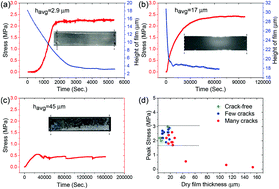Cracking in drying films of polymer solutions
Abstract
Thin films of polymer coatings have important industrial applications ranging from paints and coatings to pharmaceuticals. In many applications, the coatings are obtained by applying thin films of dilute polymer solutions, wherein the solvent evaporates to leave behind a thin polymer film. In some cases, the thin films may crack due to shrinkage stresses developed during drying. While a number of studies have focused on the stress development, the phenomenon of cracking in polymer films is not fully investigated. In the present work, thin films of a silicone polymer solution were cast on substrates of varying Young's moduli and investigated for cracking as a function of film thickness and substrate modulus. Micro-Raman spectroscopy measurements show that thin films dry uniformly while thick films form a skin at the top surface leading to slow drying rates. Transverse stresses were measured using the cantilever technique and related to the extent of cracking in the film. We investigated the influence of substrate rigidity on the cracking behavior and found that decreasing the stiffness of the substrate increases the extent of cracking.



 Please wait while we load your content...
Please wait while we load your content...